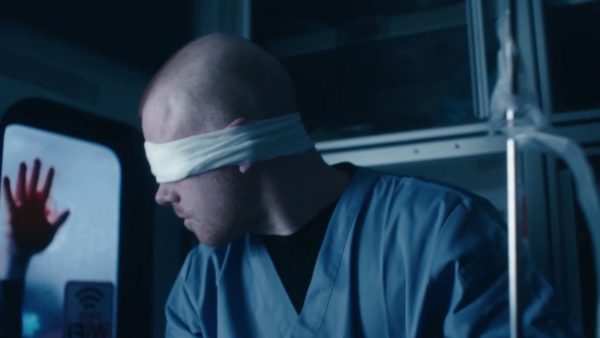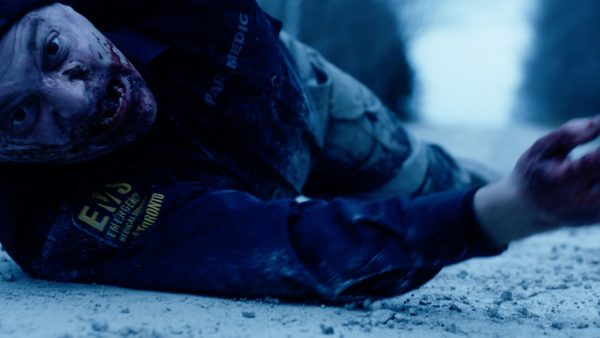
A blind man and a pregnant police officer try to survive a zombie apocalypse. It’s not the start of a joke; it’s Deadsight.
It can be tough to make a zombie film that stands out from the rest, particularly in the wake of the recent renaissance that has flooded the cultural landscape with new and varied interpretations.
Deadsight doesn’t necessarily reinvent the genre, but this is an admirable effort to bring the shuffling flesh-eaters down to earth in the face of more audacious Hollywood efforts. This is a low-budget Canadian horror film that focuses almost exclusively on two protagonists, features a few locations and boasts a bevy of mid-speed zombies (not quite fast, not quite slow). The result is a stripped down survival story with a solid amount of tension.
The film focuses on two distinct characters. In the opening scene, a blind man wakes up handcuffed in the back of an abandoned ambulance. He is Ben Neilson (Adam Seybold), a man with short term memory loss; he knows who he is, but not how he became injured or what happened immediately before he awoke. Ben’s vision loss provides Deadsight with the majority of its scares: his inability to see predators lurking behind him continually reinforces how vulnerable he is, a visual motif that director Jesse Thomas Cook mines to great effect both out in the open, as well as in the tight confines of the abandoned house that Ben eventually wanders into.
The other character is introduced immediately after the title card. Mara Madigan (Liv Collins, who also cowrote the screenplay along with Kevin Revie) is a pregnant police officer just going about her daily business. After hearing Ben’s staticky pleas over the radio, she loses her vehicle in a violent encounter with an infected woman, a course of action that ultimately leads her to the house where Ben is hiding out.

These early scenes are when Deadsight is at its most enigmatic and its most suspenseful. The rules of the infection are uncertain, the backstory of the two protagonists remains a fascinating mystery and each new zombie encounter feels fresh. The film employs a blue colour filter that lends Deadsight – particularly the outdoor scenes – a chilly atmosphere without sacrificing the grounded, realistic feel. The film was shot in Owen Sound, Ontario and the sense of desolate countryside and casually lived-in interiors gives the narrative an authentic vibe. The set dressing of the house and, later, an RV, is spot-on.
If the film falters a little, it is that the 89 minute runtime feels a touch too long. By focusing exclusively on two characters, Deadsight initially plays like an intimate character study (which is a strength early on). Collins and Revie’s decision not to elaborate on some of the broader mysteries, however, eventually means that the film runs out of momentum and, in the latter half, character beats are supplanted by a series of generic attack sequences. The make-up effects of the creatures is impressive in a restrained, almost understated fashion, but the setpieces aren’t distinct enough. By the time the film culminates in an extended climax at a factory, Deadsight succumbs to an overt sense of zombie familiarity. We’ve seen this battle before.
Despite these mild criticisms, Deadsight is an enjoyably subdued, character-focused zombie film with great tension and atmosphere. It plays like a less philosophical English-language counterpart to Quebec zombie film Les Affamés and the pair would make for a lovely Canadian horror double bill.
3/5
Deadsight is now available on VOD, Blu & DVD